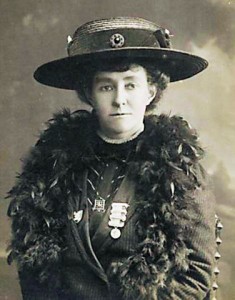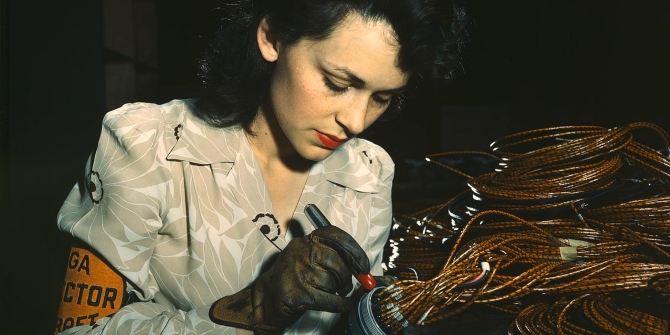 Reflecting on the life and death of Emily Wilding Davison, Mary Evans explores how individual acts seem to be increasingly necessary to individuals when it appears that no other possibilities exist for meaningful attention or change. The need to dramatise politics is perhaps as important in 2013, especially for the marginalised for whom bringing about change ‘through the system’ is a non-starter, as it was in 1913.
Reflecting on the life and death of Emily Wilding Davison, Mary Evans explores how individual acts seem to be increasingly necessary to individuals when it appears that no other possibilities exist for meaningful attention or change. The need to dramatise politics is perhaps as important in 2013, especially for the marginalised for whom bringing about change ‘through the system’ is a non-starter, as it was in 1913.
A hundred years ago Emily Davison sustained fatal injuries when – it now appears – she attempted to fix a suffragette banner onto the King’s horse at the Derby. This was not a suicide attempt and as both her return ticket to London and footage of the event suggest she did not intend to die. But die she did and since that time she has become known as a ‘martyr’ and a literal representation of a figure attempting to question forces much more powerful than herself. The anniversary of her death has accordingly been marked by various meetings to honour her memory and to record still unfulfilled aspirations to gender equality.
Yet politics and martyrs (not to mention religions and martyrs) have longer and more complex histories than any one life, however much we may wish to honour and remember an individual. Recognising that complexity is an important part of how we might consider our reactions to Emily Davison’s death and indeed that of other individuals, male and female, who have become, through the manner of their death, iconic figures for various forms of politics.

In the case of Emily Davison we might start with that reading of twentieth century British politics which often singles out the Suffragettes as the most important aspect of women’s history in the past one hundred years. The enfranchisement of women mattered then as it does today and any society which denies to women this form of civic equality clearly has considerable work to do on its understanding of politics. But it is only necessary to pick up two histories of Britain in the late nineteenth and early twentieth century – E.J.Hobsbawm’s The Age of Empire and Sheila Rowbotham’s Women Who Invented the Twentieth Century to find two very important themes: one, that women in the decades associated with suffragette politics campaigned on various issues, not the least of which was equal pay, and second, that the vote mattered very much more to middle and upper class women than it did to the majority of the female population. This latter point should not detract in any way from either the Suffragettes in general or Emily Davison in particular, but it does suggest that we should be cautious about what – and how – we remember the past.
In that context, of collective memory and dramatic political acts, we might explore how receptive we are to individual acts and how much less so to various forms of collective action. But we also might explore how individual acts – various forms of the dramatisation of politics – seem to be increasingly necessary to individuals when it appears that no other possibilities exist for meaningful attention or change. Emily Davison was an educated woman, well versed in the politics of words and arguments. To her, the right to women of the vote was transparently clear. Why then, could not the others who shared her class and education, see that case. Indeed, in 2013, resistance to this case seems equally absurd, a terrifying form of misogyny through which one enters a politics less of argued and rational ideas than of collective psychic terrors about women and the possibilities of political equality.
So perhaps Emily Davison reached that point, as others, in other contexts have done, where a kind of desperation about change becomes dominant, where it seems as if all the position papers, all the careful and reasoned argument, count for nothing against power and in particular the power of the state. Campaigners against nuclear power, on issues about environmental degradation, the rights of fathers to custody of their children and the mis-treatment of animals have all adopted forms of the dramatisation of politics; in their various ways attempts to mobilise support. In 2013 we might smugly reassure ourselves that our political system allows people to work for change ‘through the system’ but for many people and many groups of people this assurance clearly has a deeply hollow sound to it. In 1913, as opposed to 2013, power was relatively transparent: Emily Davison did not wish to place her banner on any horse, but a horse belonging to Edward VII. Given the opacity of sites of institutional power in the twenty first century it can be much more difficult to bring together literal targets with forms of direct action. Yet although women in Britain now have the vote (a ‘reward’ I remember being told at school ‘for their good behaviour in the First World War’) Emily Davison’s most fitting memorial is perhaps, as much as her contribution to the suffrage cause, her recognition of the importance of politics. The paradox of her death is that she is known for that accidental circumstance and not for the collective process that she supported.
To mark the Emily Davison’s centenary, the LSE Digital Library has put together a unique collection of materials from the life and death of the suffragette.
Note: This article gives the views of the author, and not the position of the British Politics and Policy blog, nor of the London School of Economics. Please read our comments policy before posting.
Mary Evans is a Centennial Professor at the LSE, based at the Gender Institute. She has written on various aspects of gender and women’s studies and many of those publications have crossed disciplinary lines between the social sciences and the humanities. She was a founding editor of the European Journal of Women’s Studies and is presently working on a study of narratives – and continuities – of class and gender. Her latest edited book is Gender (Routledge, 2010).








